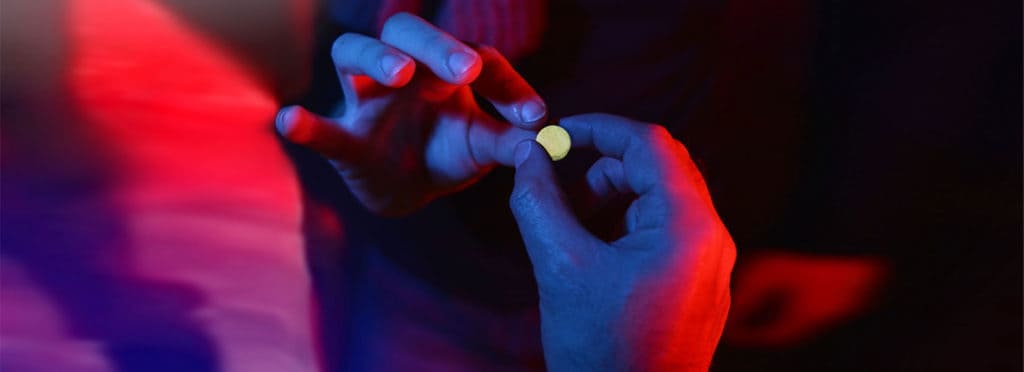Determining if you are struggling with an MDMA addiction requires an in-depth examination of priorities and habits. Do you use MDMA whenever you go to a party? Do you need MDMA in order to have fun?
In order to determine if you are addicted to MDMA, you will need to be able to identify the common signs of this addiction, as well as understand the dangers of MDMA abuse if left untreated.
Dangers of MDMA Abuse
MDMA is a synthetic psychoactive drug that’s used for recreational purposes. It affects mood and perception and provides feelings of pleasure, emotional warmth, and increased energy. MDMA rose to popularity in raves and the nightclub scene but it is now more widely used. It is more commonly known as molly or ecstasy. MDMA can be dangerous whether used alone or in combination with other drugs.
MDMA increases the levels of norepinephrine in the brain, causing an increase in blood pressure and heart rate. Likewise, the drug also increases serotonin levels which are responsible for the sensory enhancement and overall feelings of euphoria. Since MDMA lowers inhibitions, it can lead to risky sexual behavior that increases the risk of developing a sexually transmitted infection, or leave the user vulnerable to accidents or violent assaults.
As a hallucinogenic stimulant, MDMA increases body temperature significantly. While under the influence of this substance, the user typically is unaware of this change, therefore risks of hyperthermia increase. As stated by the National Institute on Drug Abuse, even moderate doses of MDMA interfere with the body’s ability to regulate temperature, potentially leading to deadly consequences in warm environments. Treatment of hyperthermia requires prompt medical attention, as it can rapidly lead to muscle breakdown or an electrolyte imbalance, which can, in turn, produce kidney failure or fatal swelling of the brain.
Signs of MDMA Abuse
MDMA has a profound impact on an individual’s life and health. Universal signs of addiction include isolation, secretive use, and personality changes, among others. Although MDMA addicts may display these signs, there are indicators specific to MDMA abuse that suggest addiction has developed. The following signs are unique to MDMA abuse.
Anxiety
As a psychoactive stimulant, prolonged MDMA abuse can generate restlessness, anger, and anxiety in individuals. This is due to the chemical alteration that takes place in the brain when MDMA is used. After using the drug for a significant amount of time, chemical transmitters in the brain may become permanently altered, leading to anxiety or mood disorders in the user. If the person seems increasingly irritable or on edge, MDMA use may have developed into an addiction.
Memory Loss
Prolonged use of MDMA can cause brain damage, brain shrinkage, and permanent chemical imbalance. These conditions impact the user’s memory and cognitive functioning. Because of this, those struggling with an MDMA addiction typically struggle to remember short or long-term events.
Depression
Since MDMA abuse causes a chemical alteration within the brain, mood disorders are likely to develop with prolonged use. When used, MDMA releases a large amount of serotonin which is responsible for the user’s feelings of euphoria. After time, the neurotransmitters in the brain become incapable of naturally producing serotonin without the presence of MDMA, causing the user to feel depressed. In many cases, this depression reinforces the urge to continue using.
Treatment for MDMA Addiction
Addiction is a devastating disease and you do not have to fight it alone. The founders of Asheville Recovery Center, as well as many of our addiction therapists, have struggled with addiction and now enjoy life in recovery. They understand the struggles of addiction and how difficult it is to overcome on your own.
At Asheville Recovery Center, specialists have combined various therapies, treatments, and 12-step approaches to develop an effective, hybrid model of treatment designed to fit every individual’s unique circumstances.
If you feel that you or a loved one is struggling with substance abuse, our specialists are on standby and ready to help. Call (828) 518-6996 and speak with an addiction expert today so you can take the first step towards a rewarding life of sobriety.









